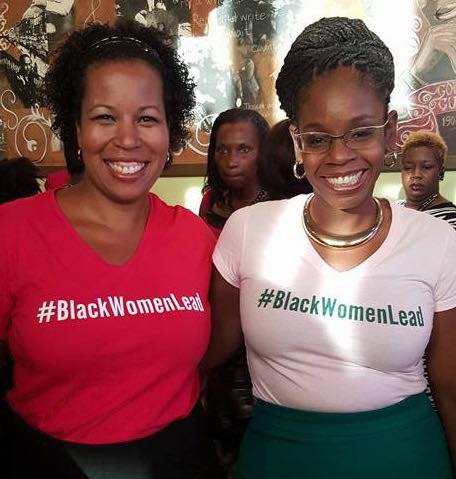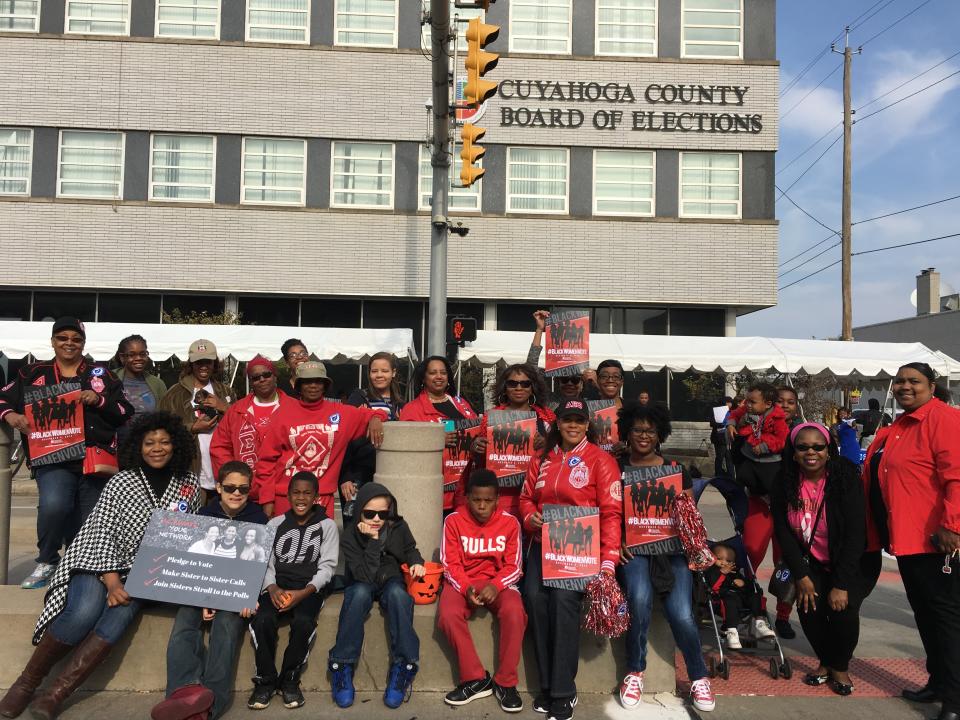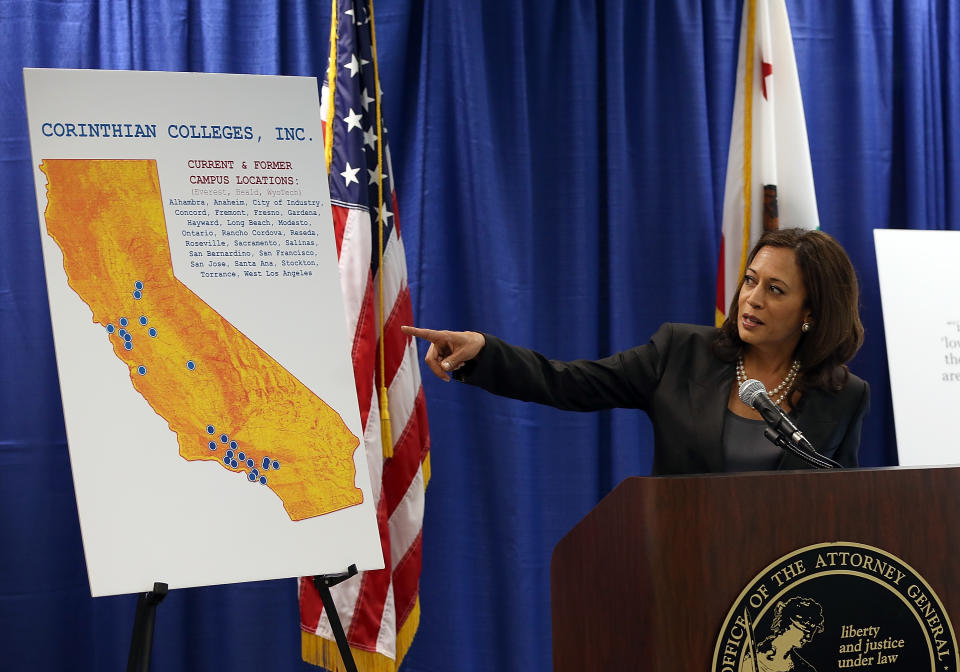History, Polls Show Black Women Voters Show Up
On a crisp fall weekend in New York City, Kimberly Peeler-Allen might normally be outdoors enjoying the colorful foliage with family.
Instead, just days before the 2016 presidential election, the wife, mother and co-founder of the political advocacy group, Higher Heights, was in Harlem setting up a phone bank.
Along with two-dozen fellow volunteers, she called folks around the country, reminding them to vote on Tuesday.
“People are saying they’re sick and tired of being sick and tired,” said Peeler-Allen, 40, referencing a famous quote from the late activist Fannie Lou Hamer. “If that’s true, we need to vote as if our lives depend on it.”

African-American voters were key to the broad, multiracial coalition that helped clinch President Barack Obama’s historic win in 2008, and his re-election in 2012. Moreover, people of color made up some 46 percent of Obama voters in 2012, according to exit poll data.
Yet it remains to be seen whether a similar scenario will emerge this year in what’s been a highly contentious match between Democratic presidential nominee, Hillary Clinton and the Republican party’s contender, Donald Trump.
RELATED: Analysis: Will Faith Decide the 2016 Election?
Although millions of Americans have already done early voting, reports of lagging numbers among African-American voters in some states, including key battlegrounds such as Florida, has led to conjecture about turnout on November 8.
“There’s definitely some skittishness as to whether there’ll be the same level of excitement among African-American as there was for Obama,” said Andra Gillespie, a political scientist at Emory University and a fellow with the Joint Center for Political and Economic Studies, a Washington, D.C. think tank.
The Joint Center, which focuses on African-American issues, recently released results of a national survey that drew from a racially diverse sample of 1,500 participants. The poll intentionally oversampled black voters in an effort to identify trends related to different ages, income brackets and other factors.
“We found that an overwhelming majority of black men and women indicated that they saw the 2016 race as a high-stakes election,” said Gillespie, a co-author of the report. “And when it came to age and voting patterns, there was a correlation. Younger cohorts were less committed to voting.”
RELATED: Final NBC/WSJ Poll: Clinton Holds a Four-Point National Lead Over Trump
The findings also revealed that among those voters planning to cast their ballots for Clinton, African-Americans were more likely than whites or Latinos to describe their choice as a vote for the former Secretary of State, rather than a vote against Trump.
Among black voters who intended to support the Democratic nominee, a majority of older voters cited their decision as a vote for Clinton. Younger black voters were more likely to identify their pick as a vote against the real estate mogul.
Another key finding: while about 82 percent of black men reported that they would vote, the figure was 90 percent for black women.
Such data dovetails with the voting patterns of African-American women in the past two presidential elections. A report from the Center for American Progress notes that 76 percent of black women cast their ballots in 2012, more than any other demographic in the country.
That the so-called ‘sista vote’ is robust doesn’t surprise Glynda Carr, also a co-founder of Higher Heights. “We’ve emerged as a formidable voting bloc,” she said.

And the collective votes of black women may take on new importance this year, not just at the top of the ticket but other so-called `down ballot' races.
RELATED: Why the Clinton Campaign is Banking on Black Millennials
Besides electing the nation’s 45th president, Americans will also vote on 435 members of the U.S. House of Representatives, 34 Senators, 12 state governors, and 88 of the 99 state legislative chambers.
Moreover, more than three dozen of the nation’s largest cities—including Washington D.C., Baltimore, Baton Rouge and Norfolk—which all have significant black populations— will hold municipal elections for mayor and/or city council. There are also races around the country to elect District Attorneys, whose decisions whether to prosecute are critical in the era of Black Lives Matter and criminal justice reform.

“That’s why it’s so important that we raise money, build infrastructure and harness our political power and potential,” said Carr.
This election cycle, their organization has engaged black women via webinars, political salons, online “Sunday brunches” and even a "sister stroll to the polls" in Ohio.
The group, which has both a nonprofit arm and a separate political action committee, recently teamed with The Collective PAC and the Rosa PAC to host a special call about African-American women on the ballot in different states.
The candidates they're supporting include Lisa Blunt Rochester, Delaware’s first black woman to serve as Secretary of Labor who is running for Congress. Then there’s Val Demings, a former police chief in Orlando, who is seeking a Florida Congressional seat.
Meanwhile, Kamala Harris, who broke barriers as California’s first woman Attorney General and its first of color, hopes to make history as only the second black woman elected to the U.S. Senate. Carol Moseley Braun of Illinois served one term from 1993-1999, but lost her re-election bid.

“Our votes have the ability to change the tide of this election,” said Jessica L. Byrd, principal of Three Point Strategies, a consulting firm in Washington, D.C.
A millennial who formerly helped identify and train diverse female candidates for EMILY’s List, Byrd now works to build a pipeline of candidates from within the community.
“Looking ahead to 2017 and 2018, there are already two black women who plan to run as mayors,” she said.
In terms of the looming presidential race, the progressive Democrat is cautiously optimistic.
“The question is, will black women get credit if our candidate wins, or will we be blamed for a loss? There's pressure being put on our community, and it's not fair. I can just imagine the post-election narratives.”
While many pollsters say the battle for the White House is too close to call, and the outcome of other races is equally uncertain, Peeler-Allen feels confident about one thing.
“Black women are definitely going to come out, because voting is something that we do—we show up and show out,” she said. “We have consistently increased our voter margins. No one should underestimate the power and sophistication of black women voters.”

